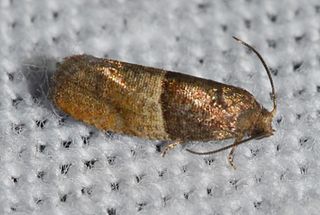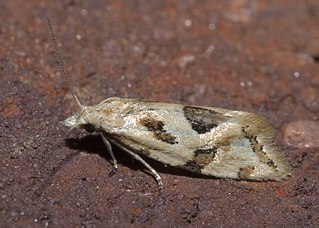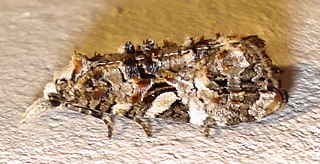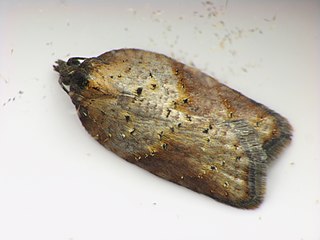| Choristoneura conflictana | |
|---|---|
 | |
| Scientific classification | |
| Kingdom: | Animalia |
| Clade: | Euarthropoda |
| Class: | Insecta |
| Order: | Lepidoptera |
| Family: | Tortricidae |
| Genus: | Choristoneura |
| Species: | C. conflictana |
| Binomial name | |
| Choristoneura conflictana (Walker, 1863) [1] | |
| Synonyms | |
| |
Choristoneura conflictana, the large aspen tortrix, is a moth of the family Tortricidae. It is found from the Pacific to the Atlantic coast and from Alaska to California, Arizona, and New Mexico.

Moths comprise a group of insects related to butterflies, belonging to the order Lepidoptera. Most lepidopterans are moths, and there are thought to be approximately 160,000 species of moth, many of which have yet to be described. Most species of moth are nocturnal, but there are also crepuscular and diurnal species.

The Tortricidae are a family of moths, commonly known as tortrix moths or leafroller moths, in the order Lepidoptera. This large family has over 10,350 species described, and is the sole member of the superfamily Tortricoidea, although the genus Heliocosma is sometimes placed within this superfamily. Many of these are economically important pests. Olethreutidae is a junior synonym. The typical resting posture is with the wings folded back, producing a rather rounded profile.

Alaska is a U.S. state in the northwest extremity of North America, just across the Bering Strait from Asia. The Canadian province of British Columbia and territory of Yukon border the state to the east, its most extreme western part is Attu Island, and it has a maritime border with Russia to the west across the Bering Strait. To the north are the Chukchi and Beaufort seas—southern parts of the Arctic Ocean. The Pacific Ocean lies to the south and southwest. It is the largest U.S. state by area and the seventh largest subnational division in the world. In addition, it is the 3rd least populous and the most sparsely populated of the 50 United States; nevertheless, it is by far the most populous territory located mostly north of the 60th parallel in North America: its population—estimated at 738,432 by the United States Census Bureau in 2015— is more than quadruple the combined populations of Northern Canada and Greenland. Approximately half of Alaska's residents live within the Anchorage metropolitan area. Alaska's economy is dominated by the fishing, natural gas, and oil industries, resources which it has in abundance. Military bases and tourism are also a significant part of the economy.




The wingspan is 25–35 mm. Adults are on wing from May to August.
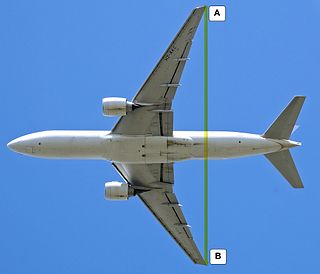
The wingspan of a bird or an airplane is the distance from one wingtip to the other wingtip. For example, the Boeing 777-200 has a wingspan of 60.93 metres, and a wandering albatross caught in 1965 had a wingspan of 3.63 metres, the official record for a living bird. The term wingspan, more technically extent, is also used for other winged animals such as pterosaurs, bats, insects, etc., and other fixed-wing aircraft such as ornithopters. In humans, the term wingspan also refers to the arm span, which is distance between the length from one end of an individual's arms to the other when raised parallel to the ground at shoulder height at a 90º angle. Former professional basketball player Manute Bol stands at 7 ft 7 in (2.31 m) and owns one of the largest wingspans at 8 ft 6 in (2.59 m).
The larvae feed on Populus tremuloides .





